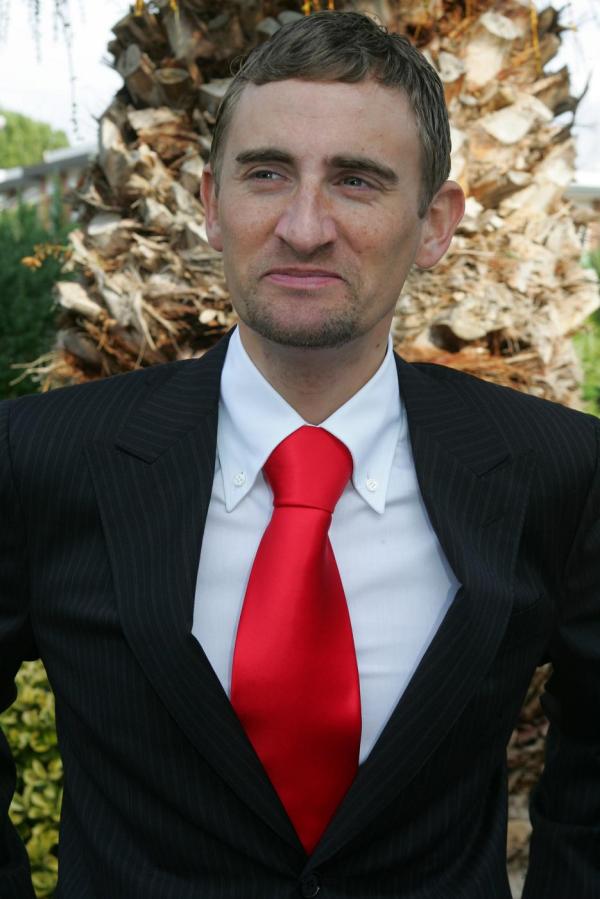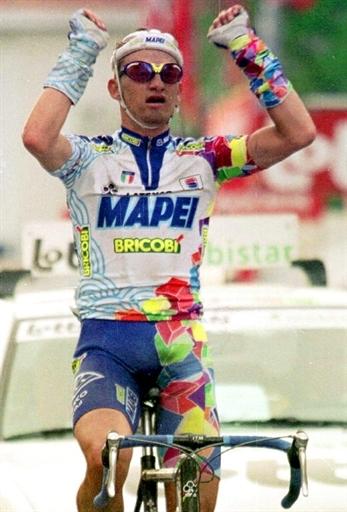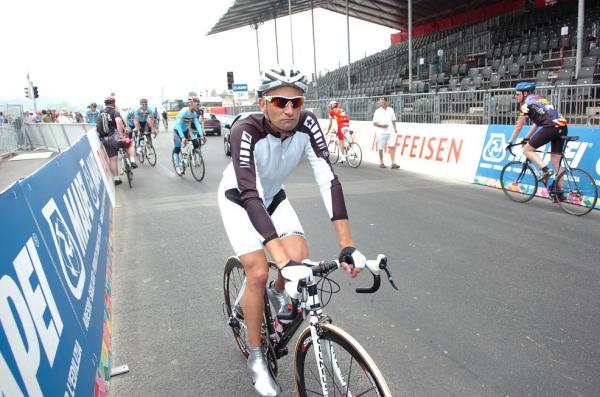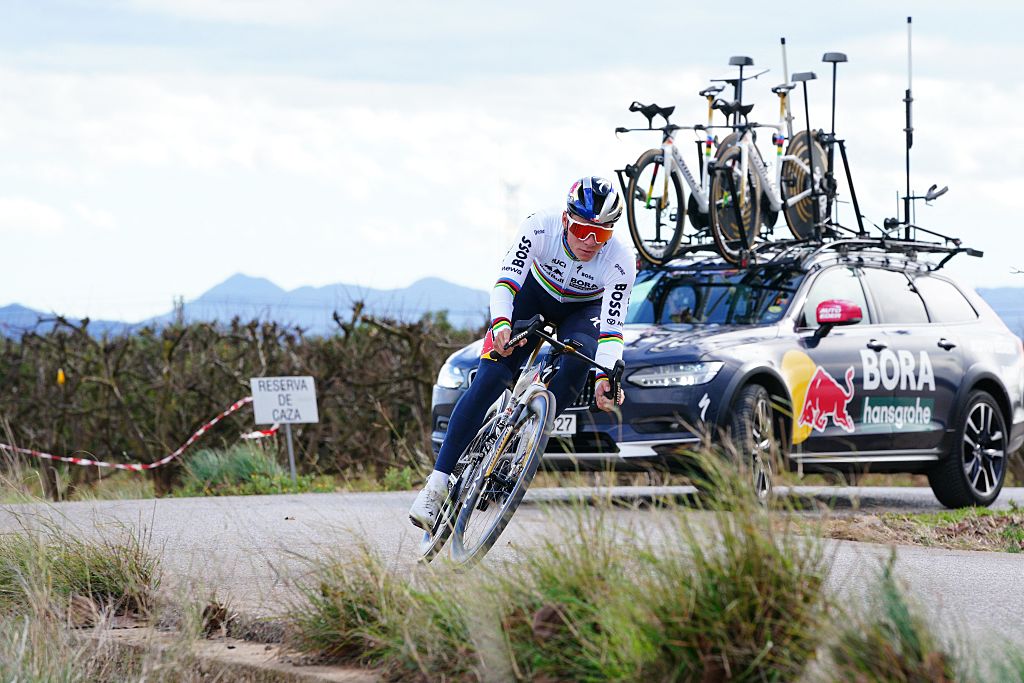Vale: Frank Vandenbroucke 1974 - 2009
Cyclingnews looks at the life of a fallen star
The latest race content, interviews, features, reviews and expert buying guides, direct to your inbox!
You are now subscribed
Your newsletter sign-up was successful



When Frank Vandenbroucke won the beginners road championship at 17 years of age in 1991, it was clear that the young Belgian was a natural talent on the bike. The ability uncovered that day in Halanzy would take Vandenbroucke on an 18-year trip to the heights of sporting fame; in turn it also took the rider affectionately known as VDB on a downward spiral to oblivion.
While Vandenbroucke's rise to stardom was gradual, the fall was abrupt - drug scandals that left his career hanging by a thread, combined with a tormented relationship with his former wife resulted in the Belgian attempting to take his own life.
Despite the depths of Vandenbroucke's falls he always dusted himself off however, determined to return to the heights of those glory years. With each failed return to cycling in recent years grew Vandenbroucke's desire to be successful in the sport once more.
It seems that only now, out of the spotlight for good, will 'Franky Boy' be able to rest in peace.
A precocious talent
Vandenbroucke was exposed to cycling at a young age through uncle Jean-Luc Vandenbroucke, himself a successful professional. Three years after acquiring his first cycling licence the young Belgian attested his ability with victory in the Belgian junior national championship before taking third at the world championships.
Those early results established a trend for the remainder of Vandenbroucke's career: he either finished in the top five or not at all. Victories at Liège-La Gleize and Cottbus Junior Tour in 1992 was proof enough for Lotto – Caloi's management and Vandenbroucke turned professional the following season at the team where his uncle was in the early phase of an 11-year stint as a directeur sportif.
The latest race content, interviews, features, reviews and expert buying guides, direct to your inbox!
Vandenbroucke showed potential in tours such as Triptyque Ardennaise and Tour du Hainaut for amateurs in that first year with Lotto, and even added an amateur track national championship to his palmarès. But it was in the one-day races that Vandenbroucke's talent really shone through, taking wins at Seraing - Aachen - Seraing and Zesbergenprijs Harelbeke.
His development as a neo professional continued throughout 1994 and into the following year. In April 1995 Vandenbroucke made a choice that put his career on a very different path, moving from the comfort of Lotto, where his uncle continued to work through 1999, to the ranks of Patrick Lefevère's Mapei team mid-season, where he would ride alongside Johan Museeuw.
He won Paris-Brussels towards the end of that season, signaling that the change of environment had a positive impact on his racing at least. Those thoughts were confirmed in 2006 when, amid a host of victories and solid finishes, he won GP Ouest France from Laurent Brochard and compatriot Andrei Tchmil.
Vandenbroucke again enjoyed a successful year in 1997, with wins at Rund um Köln the Tour de Luxembourg and a series of second placings, including at the Qatre jours de Dunkerque. But it was merely a precursor to what was to come as his career continued its upward trajectory in 1998.
While it would be his last year at Mapei, 1998 saw Vandenbroucke start the final climb to the peak of his career. He was second at Kuurne - Brussel - Kuurne to Tchmil and second again at Waalse Pijl to Bo Hamburger, but the glory was all his when he crossed the line at Gent-Wevelgem seven seconds ahead of Lars Michaelsen and Nico Mattan.
Victim of the times
Vandenbroucke's career trajectory coincided with that of doping in cycling; the watershed of July 1998 came as VDB was about to spring into the common consciousness of Belgium's cycling-mad public. His triumph in the 1999 Liege-Bastogne-Liege brought him into the living rooms of his coutrymen, although it wasn't long until he was in the news for other reasons.
But first there was the glory - wins in stages 16 and 19, plus the points classification of that year's Vuelta a España added immeasurably to the hype surrounding the then 25-year-old. He was hot property, and a slew of teams wanted to sign the Belgian, luring him away from French squad Cofidis.
With the benefit of hindsight we can see that the temptation to dope during his most successful period must have been huge. The confessions of individuals such as ex-Cofidis rider Philippe Gaumont provide some indication of the institutionalised nature of doping during the late 1990s and into the next decade; this made a young, successful Belgian such as Vandenbroucke a target for authorities looking to clamp down on illegal performance-enhancing practices.
At the turn of the century the likes of countryman Musseuw - established as the 'King of Flanders' thanks to his success in the Classics - came under the spotlight for alleged doping offences, with police surveillance, raids and legal probes into the practices of some of the sport's elite.
In 2002 the wheels began to fall off the Vandenbroucke Express following a raid on his home by police searching for prohibited substances. Authorities seized quantities of EPO, veterinary drug Clenbuterol, amphetamines and morphine during the raid, which came on the back of the arrest of his alleged supplier. The same year he was twice stopped by police whilst driving under the influence of alcohol.
The following year, Quick Step boss Lefevère threw his one-time protegé a racing lifeline with a place in the team. Second in the Ronde Van Vlaanderen provided his fans a brief respite from the bad headlines, which resumed however, when legal proceedings stemming from the 2002 police search continued to roll through the Belgian courts. The 2004 season was essentially a write-off, as were the 2005, 2006 and 2007 seasons - they were the forgotten years.
The comeback kid
Having walked into - and subsequently out of - teams such as MrBookmaker.com - Palmans, Unibet.com and Acqua e Sapone, Vandenbroucke kept returning to the fold of professional cycling despite constant no-shows and disappearances. This was a product of his depression, which led him make an attempt on his life in June 2007.
Acqua & Sapone team manager Palmiro Masciarelli's nephew Mimmo found the one-time star after his suicide attempt and told La Gazzetta dello Sport, "It was Mimmo who found him passed out at home. Frank had tried to cut his veins, without success, and he took sleeping pills. Mimmo called the police. If it was not for my nephew then we would have had found him ten days later and we would have been talking of another Pantani."
Vandenbroucke denied the episode afterwards, admitting that he was depressed; the situation with his wife was dire and was the cause of much of his pain. It was no surprise when he left the Italian Professional Continental squad before coming back again with Mitsubishi - Jartazi.
Reports soon emerged that the team was told not to include Vandenbroucke in its race rosters however, the troubled rider's appearances the reason Mitsubishi - Jartazi could be denied wildcard entries to ProTour events. The Belgian had become a pariah in the sport that had overwhelmingly celebrated him just eight years earlier; it was the beginning of the slide into the deepest reaches of his depression.
Despite his vows to return to racing earlier this year, Vandenbroucke's career never got back on track. There were flashes of brilliance before another plunge into obscurity. It appeared he had begun to publicly deal with any doping demons of the past, telling a Belgian men's magazine Che that his 1999 Liège-Bastogne-Liège title was won with the aid of illegal performance-enhancing products.
Amongst other admissions, he claimed that the win was taken "honestly", since he and the other top finishers all "rode with the same thing... we fought with equal weapons". It prompted reaction from riders, including former Dutch professional Michael Boogerd, who said he "hadn't taken him [Vandenbroucke] seriously for a long time".
It also indicated the beginning of Vandenbroucke's final ostracization from the cycling community, despite an enormous amount of affection from fans and fellow cyclists, regularly expressed on internet forums and correspondence with Cyclingnews. Vandenbroucke's death will be mourned by the same people, and it's likely that even those who had grown apart from the star in recent years will feel the void left by an individual who faded from his profession in his prime and was taken from this world before his time.
Cyclingnews would like to offer its condolences to his family and friends.
Frank Vandenbroucke (Belgium)
6 November 1974 - 12 October 2009
Major results
1995 Paris-Bruxelles
1998 Gent-Wevelgem
1998 Paris-Nice
1999 Liège-Bastogne-Liège
1999 Omloop "Het Volk"
1999 Two Vuelta a España stage wins
Team history
1993 Lotto - Caloi (Belgium)
1994 Lotto - Caloi (Belgium)
1995 Lotto - Isoglass (Belgium)
1995 Mapei - GB (Italy)
1996 Mapei - GB (Italy)
1997 Mapei - GB (Italy)
1998 Mapei - Bricobi (Italy)
1999 Cofidis, le Crédit par Téléphone (France)
2000 Cofidis, le Crédit par Téléphone (France)
2001 Lampre - Daikin (Italy)
2002 Domo - Farm Frites (Belgium)
2003 Quick Step - Davitamon (Belgium)
2004 Fassa Bortolo (Italy)
2004 MrBookmaker.com - Palmans (Belgium)
2005 MrBookmaker.com - SportsTech (Belgium)
2006 Unibet.com (Belgium)
2006 Acqua e Sapone (Italy)
2007 Acqua e Sapone - Caffè Mokambo (Italy)
2008 Mitsubishi - Jartazi (Estonia)
2009 Cinelli - Down Under (Australia)
